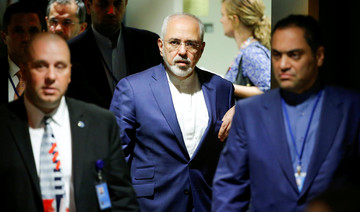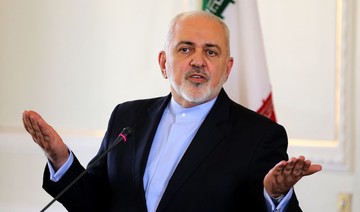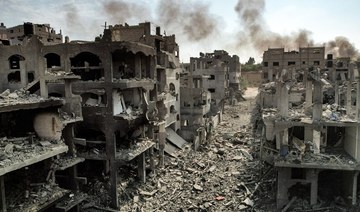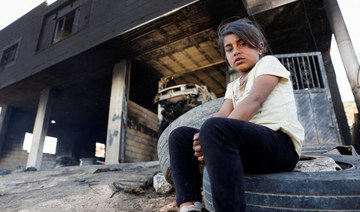DUBAI/JEDDAH: After Iranian Foreign Minister Mohammad Javad Zarif gave his resignation on Instagram Monday night, experts say it is a sign of the downward spiral facing the Islamic Republic.
The announcement by Zarif, Iran’s lead negotiator of the landmark 2015 nuclear deal with major powers, prompted reports that large numbers of diplomats are considering resigning too in a show of support.
“He couldn’t be resigning from one action. It’s a compilation of events that has led to this decision,” said Riad Kahwaji, founder and CEO of the Institute for Near East and Gulf Military Analysis in Dubai.
“When you see a head of state being received by the Supreme Leader (Ali Khamenei), accompanied by the Quds Force instead of the foreign minister, this by itself is an indication of how things are headed in Iran and who has the upper hand.”
According to Iran’s Entekhab news agency, Zarif’s resignation appears to be linked to a surprise visit by Syrian President Bashar Assad to Tehran on Monday.
The top diplomat was not present at any of the meetings Assad had with Khamenei and President Hassan Rouhani, according to the semi-official news agency ISNA.
Entekhab said it tried to reach Zarif and received the following message: “After the photos of today’s meetings, Javad Zarif no longer has any credibility in the world as the foreign minister!”
Kahwaji said the power of diplomacy has been eroded in Iran at the expense of the Islamic Revolutionary Guard Corps (IRGC), a branch of the country’s armed forces.
“The IRGC didn’t like the nuclear agreement because it imposed limitations on a program it spearheaded,” he added.
Zarif resigned on social media “to make sure he presented his own view, instead of submitting a resignation letter and waiting for the official media to give its own justification. This way, no one can claim he meant something else. He used a platform with his own voice stating the reasons for his resignation,” Kahwaji said.
There was no immediate indication that Rouhani had accepted the resignation, and a petition urging him not to do so was signed by a majority of MPs, senior lawmakers said. Kahwaji said the decision lies ultimately with Khamenei, not Rouhani.
US Secretary of State Mike Pompeo said Zarif was “one of the frontmen for a corrupt religious mafia. We note his resignation. We’ll see if it sticks.”
Pompeo added: “Our policy is unchanged — the regime must behave like a normal country and respect its people.”
Dr. Mohammed Al-Sulami, head of the Riyadh-based International Institute for Iranian Studies, said Zarif had submitted his resignation more than once before, but these were rejected.
“The visit of … Assad to Iran and the man’s resignation as foreign minister aren’t related, despite the fact that both took place in one day,” Al-Sulami said, adding that Khamenei may persuade Zarif to withdraw his resignation.
“Another assumption is that the resignation can mirror the political end of Zarif. Either the relieved Deputy Foreign Minister (Hossein) Amir-Abdollahian or Abbas Araghchi (the current political deputy) may be chosen for the post. I personally expect the former to replace Zarif.”
Dr. Arshin Adib-Moghaddam, professor in global thought and comparative philosophies at the department of politics and international studies at the School of Oriental and African Studies (SOAS) in London, said Iranian ministers and other government officials are prominent on social media, and have repeatedly used them to communicate their decisions.
“It’s deemed effective and prudent in terms of political neutrality,” he said. “Zarif has been a doyen of Iranian diplomacy ever since he was Iran’s ambassador to the UN.”
As for potential replacements, Adib-Moghaddam said Iranian foreign policy has never really been dependent on one person.
“I know from my own research that the Foreign Ministry is staffed by highly educated and capable diplomats,” he added.
Dr. Hamdan Al-Shehri, an international affairs scholar in Riyadh, said some claim that Assad’s visit to Iran did not go through the Foreign Ministry, which was considered a marginalization of Zarif and his ministry.
“Others believe that the man has failed in his tasks as foreign minister,” Al-Shehri added. “Rouhani and his men are no more than PR employees. The IRGC is the governing force in Iran, and Zarif was forced to submit his resignation.”
Al-Shehri said: “The resignation, which hasn’t been accepted or rejected by Rouhani, may also be a media distraction (from) the British government’s decision to designate Hezbollah’s political wing a terrorist organization.”
The official IRNA news agency quoted Zarif as saying: “I hope my resignation will act as a spur for the Foreign Ministry to regain its proper statutory role in the conduct of foreign affairs.”
Mark Dubowitz, CEO of the Foundation for Defense of Democracies, said Zarif was “never going to moderate the regime” in Iran.
“His job was to con Westerners into thinking the regime was moderating,” Dubowitz tweeted. “With his departure, the civilized world has one less excuse for seeing what has been in front of its nose all along.”
As the lead negotiator in the nuclear deal, Zarif’s standing within Iran’s political establishment took a hit when the US withdrew from it and re-imposed crippling unilateral sanctions last year.
Ultraconservative MPs tried to impeach Zarif but backed down in December as the initiative lost steam.
Could Zarif’s resignation be the first of many for the Iranian regime?
Could Zarif’s resignation be the first of many for the Iranian regime?
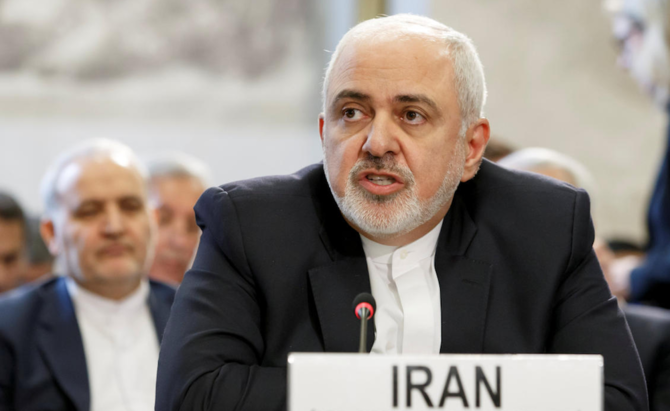
- The announcement by Zarif prompted reports that large numbers of diplomats are considering resigning too
- Experts say it is a sign of the downward spiral facing the Islamic Republic
Iraq hangs 11 convicted of ‘terrorism’: security, health sources
NASIRIYAH, Iraq: Iraqi authorities have executed this week at least 11 people convicted of “terrorism,” security and health sources said Wednesday, with rights group Amnesty International condemning an “alarming lack of transparency.”
A security source told AFP that 11 “terrorists from Daesh group” were executed by hanging at a prison in Nasiriyah, while a local medical source confirmed that the health department had received the bodies of 11 executed people.
Iraqi authorities have executed this week at least 11 people convicted of “terrorism,” security and health sources said Wednesday. (Reuters)
Biden says Israel must allow aid to Palestinians ‘without delay’
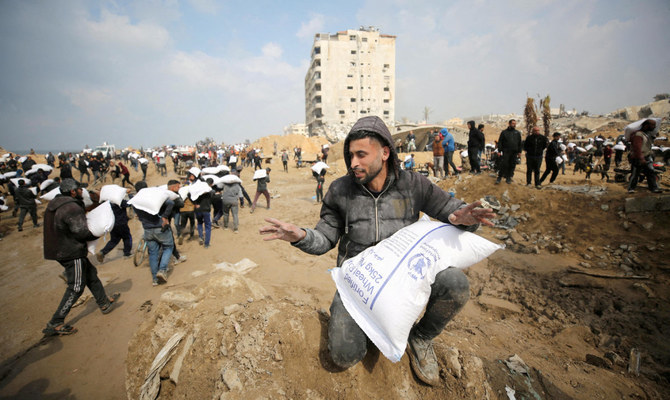
- “We’re going to immediately secure that aid and surge it,” Biden said
- “Israel must make sure all this aid reaches the Palestinians in Gaza without delay“
WASHINGTON: President Joe Biden on Wednesday demanded that new humanitarian aid be allowed to immediately reach Palestinians in the Gaza Strip as key US ally Israel fights Hamas there.
“We’re going to immediately secure that aid and surge it... including food, medical supplies, clean water,” Biden said after signing a massive military aid bill for Israel and Ukraine, which also included $1 billion in humanitarian aid for Gaza.
“Israel must make sure all this aid reaches the Palestinians in Gaza without delay,” he said.
US-Israel relations have been strained by Israel’s conduct of the war in Gaza and Israeli Prime Minister Benjamin Netanyahu’s plan to send troops into the southern Gazan city of Rafah, where 1.5 million people are sheltering, many in makeshift encampments.
“This bill significantly — significantly — increases humanitarian assistance we’re sending to the innocent people of Gaza who are suffering badly,” Biden said.
“They’re suffering the consequences of this war that Hamas started, and we’ve been working intently for months to get as much aid to Gaza as possible.”
Israel hits Lebanese border towns with 14 missiles
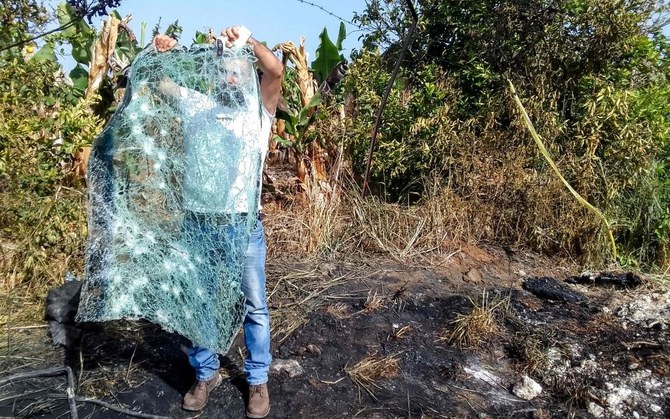
- Hezbollah targets Israeli settlements in retaliation for Hanin civilian deaths
- Hezbollah said it attacked the Shomera settlement with dozens of Katyusha rockets
BEIRUT: Clashes between Hezbollah and Israeli forces escalated sharply on Wednesday, the 200th day of conflict in southern Lebanon’s border area.
Israeli airstrikes created a ring of fire around Lebanese border towns, with at least 14 missiles hitting the area.
In the past two days, military activity in the border region has increased, with Hezbollah targeting areas in northern Acre for the first time in the conflict.
On Wednesday, Israeli strikes hit the outskirts of Aita Al-Shaab, Ramya, Jabal Balat, and Khallet Warda.
The Israeli military said it had destroyed a missile launching pad in Tair Harfa, and targeted Hezbollah infrastructure in Marqaba and Aita Al-Shaab.
Israeli artillery also struck areas of Kafar Shuba and Shehin “to eliminate a potential threat.”
Hezbollah also stepped up its operations, saying this was in retaliation for the “horrific massacre committed by the Israeli enemy in the town of Hanin, causing casualties and injuries among innocent civilians.”
A woman in her 50s and a 12-year-old girl, both members of the same family, were killed in the Israeli airstrike. Six other people were injured.
Hezbollah said it attacked the Shomera settlement with dozens of Katyusha rockets.
The group said it also targeted Israeli troops in Horsh Natawa, and struck the Al-Raheb site with artillery.
It also claimed to have killed and wounded Israeli soldiers in an attack on the Avivim settlement.
Israeli news outlets said that a rocket-propelled grenade hit a house in the settlement, setting the dwelling ablaze.
Hezbollah’s military media said that in the past 200 days of fighting with Israel, 1,998 operations had been carried out from Lebanon, Yemen and Iraq, including 1,637 staged by Hezbollah.
Egypt denies any discussions with Israel over Rafah offensive
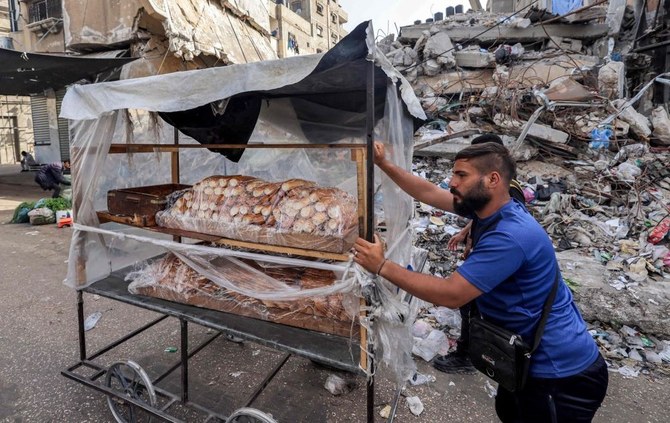
- Egypt reiterates opposition to any move on Rafah
- Warnings tell of expected losses and negative repercussions
CAIRO: Egypt has denied any discussions with Israel regarding an offensive in the Palestinian city of Rafah in the southern Gaza Strip.
Diaa Rashwan, the head of Egypt’s State Information Service, has refuted what has been claimed in one of the major American newspapers: that Egypt has discussed with the Israeli side its plans for an offensive in Rafah.
Rashwan has affirmed the Egyptian stance — announced several times by its political leadership — of complete opposition to the operation, which it is thought will lead to further massacres, massive human losses, and widespread destruction.
He added that Egypt’s repeated warnings have reached the Israeli side, from all channels, since Israel proposed carrying out a military operation in Rafah. These warnings tell of expected losses and the negative repercussions on the stability of the entire region.
Rashwan added that while Israel is contemplating its operation — which Egypt and most of the world and its international institutions stand against — Egyptian efforts since the beginning of the Israeli aggression had focused on reaching a ceasefire agreement and the exchange of prisoners and detainees.
He said Egypt was seeking the entry of humanitarian aid into the Gaza Strip, especially the north and Gaza City, and the evacuation of wounded and sick people for treatment outside the area.
Egypt has repeatedly opposed the displacement of Palestinians from Gaza and is warning against any military operation in Rafah.
UAE announces $544m for repairs after record rains
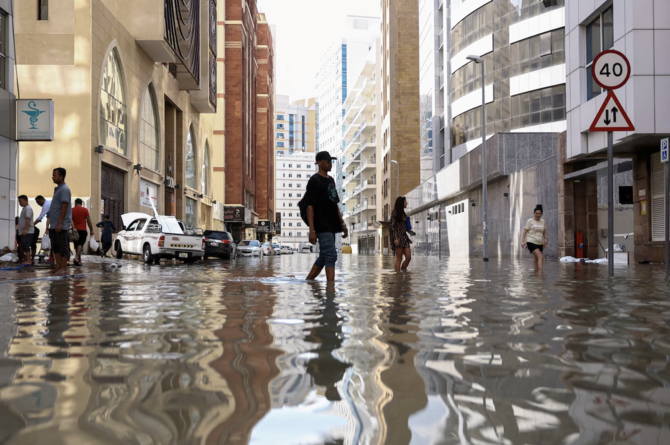
- Wednesday's announcement comes more than a week after the unprecedented deluge lashed the desert country
- “The situation was unprecedented in its severity but we are a country that learns from every experience,” Sheikh Mohammed said
DUBAI: The United Arab Emirates announced $544 million to repair the homes of Emirati families on Wednesday after last week’s record rains caused widespread flooding and brought the Gulf state to a standstill.
“We learned great lessons in dealing with severe rains,” said Prime Minister Sheikh Mohammed bin Rashid Al-Maktoum after a cabinet meeting, adding that ministers approved “two billion dirhams to deal with damage to the homes of citizens.”
Wednesday’s announcement comes more than a week after the unprecedented deluge lashed the desert country, where it turned streets into rivers and hobbled Dubai airport, the world’s busiest for international passengers.
“A ministerial committee was assigned to follow up on this file... and disburse compensation in cooperation with the rest of the federal and local authorities,” said Sheikh Mohammed, who is also the ruler of Dubai, which was one of the worst hit of the UAE’s seven sheikhdoms.
The rainfall was the UAE’s heaviest since records began 75 years ago.
Cabinet ministers also formed a second committee to log infrastructure damage and propose solutions, Sheikh Mohammed said in a post on X, formerly Twitter.
“The situation was unprecedented in its severity but we are a country that learns from every experience,” he said.
The storm, which dumped up to two years’ worth of rain on the UAE, had subsided by last Wednesday.
But Dubai faced severe disruption for days later, with water-clogged roads and flooded homes.
Dubai airport canceled 2,155 flights, diverted 115 and did not return to full capacity until Tuesday.



